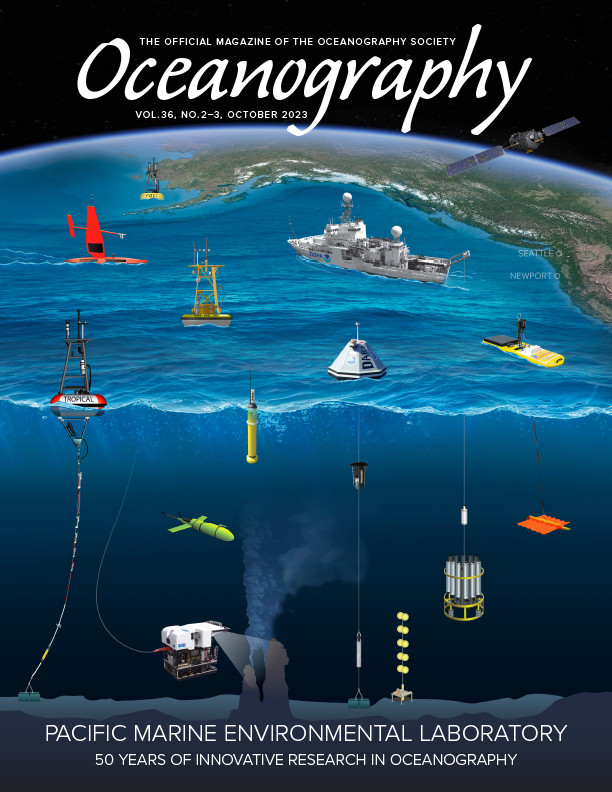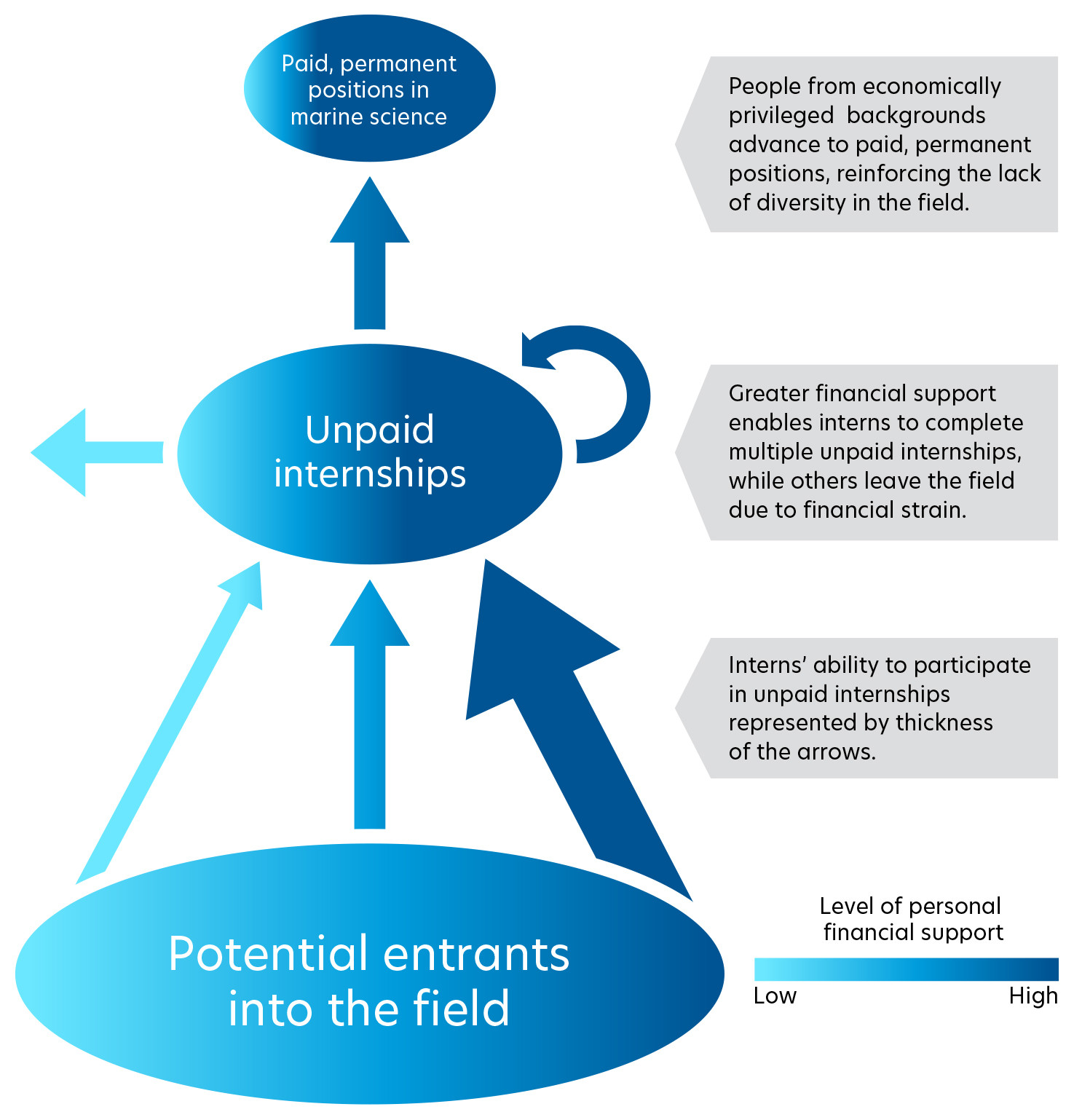Full Text
Unpaid internships provide opportunities for students and early career individuals to gain work experience in a field of their interest. In lieu of payment for their labor, interns are compensated by gaining deeper knowledge of the field or industry as well as networking opportunities. Completing an unpaid work experience is nearly unavoidable for early career individuals to gain the experience required to stand out within a competitive, passion-driven field (Bailey et al., 2022).
Unpaid positions can be an exclusionary point for people from non-affluent socioeconomic backgrounds, and the stress experienced from a lack of financial and professional support can lead to individuals exiting the field in the early stages of their career. Unpaid internships impede diverse recruitment and contribute to the overwhelming lack of diversity in the ocean sciences (Bernard and Cooperdock, 2018, Figure 1). Adequately compensating individuals entering the field for their work would increase diversity in entry level positions and promote the development of early career researchers. These individuals would be more likely to advance into higher level, permanent positions, thereby improving diversity in all career levels throughout marine science (Fournier et al., 2019; Osiecka et al., 2022).
|
|
Unpaid Positions Remain Ubiquitous
In fields such as marine science, early career researchers have long faced intense competition for limited positions, and institutions have been able to capitalize on the many eager applicants to supply the unpaid workforce. In 2001, 33% of the entry level job positions listed on the Texas A&M wildlife and fisheries science job board were unpaid or volunteer (Whitaker, 2003). Nearly two decades later, in a 2019 survey of environmental job boards, 27% were classified as underpaid, with stipends and wages below the minimum wage (Jensen et al., 2021). Of the positions listed that would be suitable for early career job seekers in marine science, 55% were unpaid, with nonprofits and private companies posting the majority of unpaid listings (Osiecka et al., 2021). In the United States and Europe, looking exclusively at entry level positions offered by universities and government organizations, unpaid positions comprised 28.6% and 33.3%, respectively (Osiecka et al., 2021).
Consequences and Implications of Unpaid Internships
In a town hall discussion at the 2022 Ocean Sciences Meeting, members of The Oceanography Society identified gatekeeping as the largest barrier to diversifying the ocean sciences (Meyer-Gutbrod et al., 2023). Meyer-Gutbrod et al. (2023) define gatekeeping as “a system of implicit or explicit cultural and institutional constraints to and requirements for entry into a field.” Unpaid internships are an example of gatekeeping in the ocean sciences. Internships can carry a large financial burden, including living expenses, gear and clothing required for a position, medical insurance, health care, and potentially dependent care. These positions are often seasonal or temporary, and even if onsite housing is provided, participants must often travel and maintain more permanent housing elsewhere. Unpaid full-time positions typically do not provide enough time for another paid job to be maintained and generate a livable income, thereby limiting the possibility for interns to self-fund their experiences. This type of economic gatekeeping hinders the advancement of a diverse group of candidates in the field, and studies show that these barriers most directly exclude minority groups including BIPOC, members of the LGBTQ+ community, and those with disabilities (Morales et al., 2020; Wanelik et al., 2020; Jensen et al., 2021; Osiecka et al., 2021).
Unpaid internships in marine science can lead to undervaluing labor throughout the workforce hierarchy. One consequence of this practice is that funding agencies may underestimate the actual cost of a project because the contributions of unpaid interns are not considered (Whitaker, 2003; Siebert and Wilson, 2013; Fournier and Bond, 2015). Similarly, it can be more difficult for researchers to argue for increased funding to host paid positions or increase wages of existing positions if the hours contributed by unpaid interns are not figured into total project costs. As a result, the researchers may need to continue to rely on unpaid labor (Fournier and Bond, 2015).
Self-funding a full-time experience can be very stressful, and the multifaceted layers of demands and expectations that early career researchers take on are associated with significant mental health impacts, including depression, anxiety, panic attacks, and burnout (Andrews et al., 2020; Osiecka et al., 2022). Whitaker (2003) described how this pressure develops with regard to financial strain: “These individuals [new members trying to enter the field] felt obliged to suffer in silence lest they diminish their supervisor’s perception of their constitution, work ethic, and motivations, thereby sparing supervisors the unpleasant burden of knowing the hardship their understudies were suffering.” More than 20 years later, the critique of unpaid work in the field of environmental sciences remains the same. Although Whitaker was not addressing the lack of diversity in the field due to unpaid full-time work, the culture of silence that has been fostered within the field, coupled with interns’ need to maintain good reputations, creates a harmful fear of self-advocacy that demands attention.
Unpaid internships are often rationalized as investments for future career success, but they are not always the gateway they are purported to be (Figure 1). In wildlife-related positions, there was no significant relationship between individuals who completed multiple unpaid positions and future success in the field, while holding paid positions was positively correlated with future success (Bailey et al., 2022). Paid positions in early career stages are more likely to help individuals achieve paid, permanent, or graduate school positions three to five years later in their careers (Fournier et al., 2019; Bailey et al., 2022).
Conclusion
Providing equitable opportunities for early career researchers to gain experience through internships and course work is essential for retaining people from underrepresented groups in the field of marine science (Beltran et al., 2020; Jensen et al., 2021). Increasing diversity at the intern level requires paying interns at least minimum wage (Jensen et al., 2021) and creating a safe work environment to relieve the unbalanced power dynamics present in unpaid internships (Morales et al. 2020; Amon et al., 2022). People in permanent, senior positions have a responsibility to allocate funding for internship positions for early career researchers with limited experience. It is imperative that we reduce or eliminate unpaid internships in marine science to help build a more equitable, diverse, and inclusive field.


